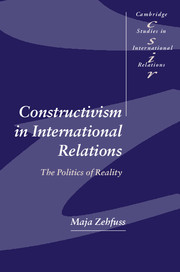Book contents
- Frontmatter
- Contents
- Acknowledgements
- List of abbreviations
- 1 Introduction
- 2 Identity change? Wendt's constructivism and German military involvement abroad
- 3 Intersubjectivity and the normative: Kratochwil's constructivism and German military involvement abroad
- 4 Words and world: Onuf's constructivism and German military involvement abroad
- 5 The politics of ‘reality’: Derrida's subversions, constructivism and German military involvement abroad
- 6 The politics of constructivism
- Bibliography
- Index
- CAMBRIDGE STUDIES IN INTERNATIONAL RELATIONS
2 - Identity change? Wendt's constructivism and German military involvement abroad
Published online by Cambridge University Press: 22 September 2009
- Frontmatter
- Contents
- Acknowledgements
- List of abbreviations
- 1 Introduction
- 2 Identity change? Wendt's constructivism and German military involvement abroad
- 3 Intersubjectivity and the normative: Kratochwil's constructivism and German military involvement abroad
- 4 Words and world: Onuf's constructivism and German military involvement abroad
- 5 The politics of ‘reality’: Derrida's subversions, constructivism and German military involvement abroad
- 6 The politics of constructivism
- Bibliography
- Index
- CAMBRIDGE STUDIES IN INTERNATIONAL RELATIONS
Summary
Alexander Wendt set out to show that (Neo)Realists are wrong: it is not an unchanging fact that the international realm is a self-help system. Rather, the international environment is created and recreated in processes of interaction. As the way states act may change, so can the international system. The key move in this argument is that actors' identities are not given but are developed and sustained or transformed in interaction (see ISC 48; A; STIP). This is, he argues, what sets a constructivist approach apart from the ‘rationalism’ of mainstream approaches to the study of international politics. Rationalists may admit that behaviour changes but they consider the properties of actors, such as their identity, external and prior to the process of international politics. The concept of identity is employed to establish the difference from rationalism. The constructivist alternative presented by Wendt revolves around the construction of identity.
Wendt's work is addressed to the ‘mainstream’ (see A 397, n. 21; STIP). In his influential ‘Anarchy Is What States Make of It’, he locates his approach, with respect to the debate between Realists and liberals, where both sides share a commitment to rationalism and thus the assumption that agents' identities and interests are given. In Wendt's view, there is, however, a tradition of ‘strong’ liberal scholarship concerned with complex learning and thus changes in interests and identities (A 393).
- Type
- Chapter
- Information
- Constructivism in International RelationsThe Politics of Reality, pp. 38 - 93Publisher: Cambridge University PressPrint publication year: 2002



